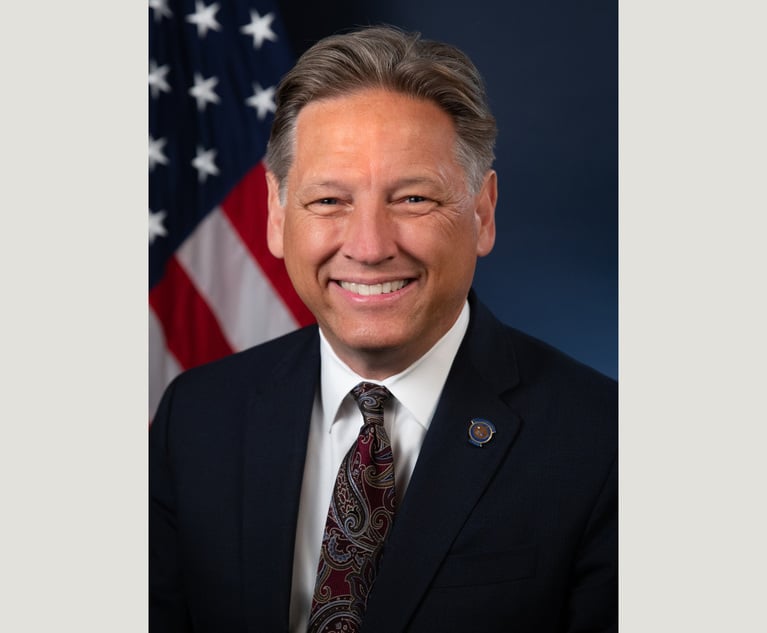Marijuana's Rapid Growth Could Put New Spotlight on Arbitration
As California prepares to launch a projected $5 billion recreational marijuana market in January, business litigators are eyeing another potential…
September 28, 2017 at 02:56 PM
6 minute read
The original version of this story was published on Law.com
 As California prepares to launch a projected $5 billion recreational marijuana market in January, business litigators are eyeing another potential green rush: arbitration.
As California prepares to launch a projected $5 billion recreational marijuana market in January, business litigators are eyeing another potential green rush: arbitration.
Attorneys who are working with medical marijuana clients say alternative dispute resolution offers the same advantages sought by litigants in any nascent industry—privacy and speedy disposition of disputes. But mediation and arbitration also promise something more, those lawyers say. The two schemes are a natural fit for businesses accustomed to operating on the fringes of the law in an industry where regulators are still writing the rules.

“Very few of the cases I deal with have one party that is lily white,” said Katy Young, a business and commercial litigation partner at Ad Astra Law Group in San Francisco. If one party files a complaint in court and “a regulator gets their hands on that lawsuit, which they very well could, someone risks losing their license altogether.”
Young and other litigators in the marijuana space say they plead with their clients to always include a mediation or arbitration clause in their contracts.
“Word gets around” when you file a lawsuit, Dean Richardson, vice chairman of Moye White's trial section, told colleagues at the Cannabis Law Institute conference this summer in Denver. “You would rather have [a dispute] in arbitration than have your dirty laundry aired.” He added: “No investor is going to touch your company.”
Several attorneys in Colorado and California are working to open specialized ADR boutiques to lure marijuana clients. The practices have yet to catch fire, a natural result, some say, of starting a new business without much traditional marketing and targeting an industry with a history of avoiding legal venues.
A spokeswoman for JAMS, one of the country's largest providers of ADR services, declined to say whether the company handles disputes involving marijuana-related businesses or, if it does, whether any rules or restrictions apply. A spokesman for the not-for-profit American Arbitration Association did not respond to messages seeking comment.
“We're kind of in a transition now,” said Scot Candell, a medical marijuana attorney at Scot Candell & Associates in the Bay Area. “Because it's been in the black market for so long people are not used to addressing these issues.”
But watch what happens over the next year, Candell predicted. “There are going to be a ton of issues.”
The potential sources of disputes for marijuana-related enterprises and ancillary businesses are plentiful: leases and real estate agreements, intellectual property rights, securities, partnership and ownership disputes, product content issues and run-of-the-mill contract spats.
“Essentially it's like any other business dispute, except the business is still illegal under federal law,” said Michael Marx, the lead mediator for the Cannabis Arbitration and Legal Mediationprogram. The mediation and arbitration program, still ramping up for services in Northern and Southern California, is sponsored by the National Organization for the Reform of Marijuana Laws' Women's Alliance.
With mediation, Marx said, marijuana businesses don't have to worry about the state-federal conflict or waiting two to three years to get a trial date in California's courts. The program's sales pitch to marijuana clients is simple. “We are the experienced mediators who understand your business,” Marx said.
Federal courts, not surprisingly, are generally considered to be a bad option for marijuana litigants. State courts in jurisdictions where marijuana is legal can be a roll of the dice, lawyers say. Related case law is still developing, and local benches are not lacking in former prosecutors.
Young of Ad Astra Law Group recounts the story of a partnership dispute involving a couple who sold their marijuana-related business to a man and then alleged he owed them a share of the ongoing profits. When he refused, they complained to local regulators, putting the new owner's license at risk.
The local official, still trying to understand and enforce new rules himself, wanted a legal document establishing ownership. Young said the new owner, her client, could have sued in his local court. But the particular county is “not particularly cannabis friendly,” she says.
“What if I get the one judge who thinks this stuff is deadly?” Young says. She likes mandatory mediation for her marijuana clients.
“The biggest, most powerful function to bring parties to agreement on the day of mediation is the risk assessment each side has to do,” she says. “That's when mediation works.”
In Colorado, three lawyers have been trying make marijuana-related mediation work since 2015. Michael Reilly, Todd Wells and Taylor Minshall created the Denver-based Cannabis Dispute Resolution Institute, a first-of-its-kind forum for cannabis businesses eager to avoid the courts.
They have visions of taking their work nationwide, but it hasn't happened yet.
The Internal Revenue Service nixed their plans to create a nonprofit—citing the fact marijuana is still illegal under federal law—so they reformed as an LLC. The wave of ADR-seeking litigants hasn't appeared.
Reilly says he thinks it's only a matter of time, as business owners learn about arbitration and more contracts include ADR clauses. Most Colorado courts are friendly toward arbitration and cannabis, he says, “so there would be no problem taking the arbitration award and converting it into a court judgment if the losing party doesn't pay up.”
“The key right now is getting the word out,” Reilly said. “We're ready to go.”
Cheryl Miller, based in Sacramento, covers the state legislature and emerging industries, including autonomous vehicles and marijuana. Contact her at [email protected]. On Twitter: @CapitalAccounts
This content has been archived. It is available through our partners, LexisNexis® and Bloomberg Law.
To view this content, please continue to their sites.
Not a Lexis Subscriber?
Subscribe Now
Not a Bloomberg Law Subscriber?
Subscribe Now
NOT FOR REPRINT
© 2025 ALM Global, LLC, All Rights Reserved. Request academic re-use from www.copyright.com. All other uses, submit a request to [email protected]. For more information visit Asset & Logo Licensing.
You Might Like
View All

Report: US Attorney E. Martin Estrada to Resign From California's Central District
3 minute read
After Solving Problems for Presidents, Ron Klain Now Applying Legal Prowess to Helping Airbnb Overturn NYC Ban
7 minute readTrending Stories
Who Got The Work
J. Brugh Lower of Gibbons has entered an appearance for industrial equipment supplier Devco Corporation in a pending trademark infringement lawsuit. The suit, accusing the defendant of selling knock-off Graco products, was filed Dec. 18 in New Jersey District Court by Rivkin Radler on behalf of Graco Inc. and Graco Minnesota. The case, assigned to U.S. District Judge Zahid N. Quraishi, is 3:24-cv-11294, Graco Inc. et al v. Devco Corporation.
Who Got The Work
Rebecca Maller-Stein and Kent A. Yalowitz of Arnold & Porter Kaye Scholer have entered their appearances for Hanaco Venture Capital and its executives, Lior Prosor and David Frankel, in a pending securities lawsuit. The action, filed on Dec. 24 in New York Southern District Court by Zell, Aron & Co. on behalf of Goldeneye Advisors, accuses the defendants of negligently and fraudulently managing the plaintiff's $1 million investment. The case, assigned to U.S. District Judge Vernon S. Broderick, is 1:24-cv-09918, Goldeneye Advisors, LLC v. Hanaco Venture Capital, Ltd. et al.
Who Got The Work
Attorneys from A&O Shearman has stepped in as defense counsel for Toronto-Dominion Bank and other defendants in a pending securities class action. The suit, filed Dec. 11 in New York Southern District Court by Bleichmar Fonti & Auld, accuses the defendants of concealing the bank's 'pervasive' deficiencies in regards to its compliance with the Bank Secrecy Act and the quality of its anti-money laundering controls. The case, assigned to U.S. District Judge Arun Subramanian, is 1:24-cv-09445, Gonzalez v. The Toronto-Dominion Bank et al.
Who Got The Work
Crown Castle International, a Pennsylvania company providing shared communications infrastructure, has turned to Luke D. Wolf of Gordon Rees Scully Mansukhani to fend off a pending breach-of-contract lawsuit. The court action, filed Nov. 25 in Michigan Eastern District Court by Hooper Hathaway PC on behalf of The Town Residences LLC, accuses Crown Castle of failing to transfer approximately $30,000 in utility payments from T-Mobile in breach of a roof-top lease and assignment agreement. The case, assigned to U.S. District Judge Susan K. Declercq, is 2:24-cv-13131, The Town Residences LLC v. T-Mobile US, Inc. et al.
Who Got The Work
Wilfred P. Coronato and Daniel M. Schwartz of McCarter & English have stepped in as defense counsel to Electrolux Home Products Inc. in a pending product liability lawsuit. The court action, filed Nov. 26 in New York Eastern District Court by Poulos Lopiccolo PC and Nagel Rice LLP on behalf of David Stern, alleges that the defendant's refrigerators’ drawers and shelving repeatedly break and fall apart within months after purchase. The case, assigned to U.S. District Judge Joan M. Azrack, is 2:24-cv-08204, Stern v. Electrolux Home Products, Inc.
Featured Firms
Law Offices of Gary Martin Hays & Associates, P.C.
(470) 294-1674
Law Offices of Mark E. Salomone
(857) 444-6468
Smith & Hassler
(713) 739-1250







